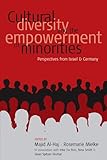Cultural Diversity and the Empowerment of Minorities : Perspectives from Israel and Germany / ed. by Majid Al-Haj, Rosemarie Mielke.
Material type: TextPublisher: New York ; Oxford : Berghahn Books, [2007]Copyright date: ©2007Description: 1 online resource (304 p.)Content type:
TextPublisher: New York ; Oxford : Berghahn Books, [2007]Copyright date: ©2007Description: 1 online resource (304 p.)Content type: - 9781845451950
- 9781782382126
- 305.8 23
- HN660.Z9 M843 2007
- online - DeGruyter
| Item type | Current library | Call number | URL | Status | Notes | Barcode | |
|---|---|---|---|---|---|---|---|
 eBook
eBook
|
Biblioteca "Angelicum" Pont. Univ. S.Tommaso d'Aquino Nuvola online | online - DeGruyter (Browse shelf(Opens below)) | Online access | Not for loan (Accesso limitato) | Accesso per gli utenti autorizzati / Access for authorized users | (dgr)9781782382126 |
Frontmatter -- CONTENTS -- List of Figures and Tables -- Preface -- Introduction: Education, Multiculturalism, and Empowerment of Minorities – An Overview -- Part I. General Overview -- 1. Stories of Struggle: Transnational Advocacy and Democracy Education -- 2. What’s Going on between Members of Majorities and Minorities? Contributions from Social Psychology -- 3. Talking at Cross-purposes: Misunderstanding in Intercultural Communication -- Part II. The Israeli Case -- 4. A Curriculum between Conflict and Peace: The Teaching of History in Jewish and Arab Schools in Israel -- 5. The Evolving Arab Reception of the Holocaust and Palestinian Textbooks: A Contribution to Democracy and Peace Education? -- 6. Police–minority Relations in a Multicultural Society: The Israeli Case -- 7. On the Central Role of “Threat Perception” in Mediating the Influence of Socioeconomic Factors on Xenophobic Attitudes -- 8. A Multimedia Lexicon as a Tool for Increasing Societal Tolerance -- 9. When Gender Differences Surpass Cultural Differences in Personal Satisfaction with Body Shape in Israeli College Students -- 10. Postcolonial Feminism, the Politics of Identification, and the Liberal Bargain -- Part III. The German Case -- 11. Acculturation Attitudes and Bilingual Classrooms in Germany. The Portuguese–German Example -- 12. “Not Always Proud to be American”: The Reconstruction of National Identity by Americans Residing in Germany -- 13. Oral Mistake Corrections in Second-language Classrooms -- 14. Intercultural Competence in Management Consultancies in Germany: Does It Exist? -- Notes on Contributors -- Index of Names -- Index of Subjects
restricted access online access with authorization star
http://purl.org/coar/access_right/c_16ec
Conflicts between different racial, ethnic, national and other social groups are becoming more and more salient. One of the main sources of these internal conflicts is social and economic inequality, in particular the increasing disparities between majority and minority groups. Even societies that had been successful in dealing with external conflicts and making the transition from war to peace have realized that this does not automatically resolve internal conflicts. On the contrary, the resolution of external conflicts may even sharpen the internal ones. This volume, a joint publication of the University of Haifa and the International Center for Graduate Studies (ICGS) at the University of Hamburg, addresses questions of how to deal with internal issues of social inequality and cultural diversity and, at the same time, how to build a shared civility among their different national, ethnic, religious and social groups.
Mode of access: Internet via World Wide Web.
In English.
Description based on online resource; title from PDF title page (publisher's Web site, viewed 25. Jun 2024)


